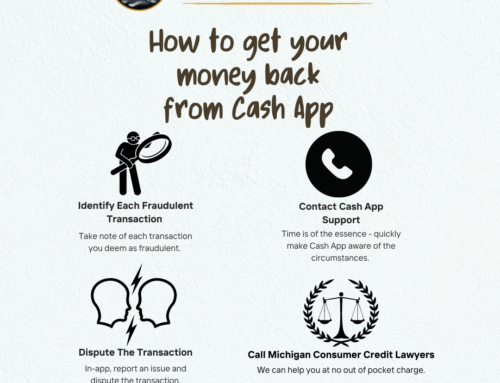
If you have been the victim of a Cash App scam and would like assistance from attorneys experienced in helping consumers fight financial scams, we stand ready to help you at no out-of-pocket charge to you. We collect our fees from the bad guys.
Contact us for a free, no obligation consultation at Credit Repair Lawyers of America at 404-591-6680 or email us [email protected].
The Human Toll of Cash App Scams
Behind Cash App scam statistics lie countless shattered lives, dreams, and futures.
Savvy scammers ruthlessly prey on those already stretched thin financially—people struggling to afford groceries, medications, or this month’s bills. By kicking victims when they’re already down, scammers sentence them to prolonged cycles of poverty and inescapable debt. The financial wounds heal slowly over years, and the psychological trauma festers indefinitely:
- Victims report losing all trust and sense of security in money apps and financial systems after falling for deceitful ploys and watching helplessly as their savings disappear.
- They lose faith in customer service departments, feeling utterly betrayed by representatives who seemingly assist scammers in draining accounts.
- Many lose trust in their judgment and decision-making abilities. Scammers specifically target those desperate for income or behind on payments, knowing they will override their better instincts to believe an offer is legitimate. Victims are then left blaming themselves rather than the criminals who manipulated their vulnerabilities.
- The destruction of financial and psychological stability leads to knock-on effects on physical health, personal relationships, career trajectories, and more.
Real-Life Examples of Cash App Scams
Cash App scammers employ incredibly clever tricks tailored to their targets. The stories below spotlight three real-life stories of people who faced a Cash App scam.
Candace’s Cash App Nightmare – A Customer Service Scam
Candace Kennedy Locklear learned this firsthand when a seemingly innocent Google search for Cash App’s customer service started a nightmarish chain of events. After calling what she thought was a legitimate support number, Locklear followed the “agent’s” instructions, hoping to fix a stuck payment. Instead, she helplessly watched as $4,000 drained from her account. The so-called customer service representative reassured her “the money’s gonna go back,” but the harsh reality soon set in that she had been scammed. Locklear’s story offers two vital lessons for all app users.
First, scammers now commonly pay for the top spots in search results, knowing people instinctively trust and click on the top hits. So always verify you are contacting the real support before providing personal details.
Second, no legitimate rep will ask users for passwords, PINs, or social security numbers. Familiarize yourself with the standard security policies so no policy breach ever catches you off guard.
The trauma of financial fraud lingers long after the deed, destroying people’s sense of security and trust in technology. Locklear lost sleep, peace of mind, and her savings—a loss no one should suffer.
Narrowly Avoiding a Facebook Marketplace Cash App Scam
A Missouri woman named Taryn Campbell narrowly avoided becoming another victim of online selling scams when a seemingly promising Facebook Marketplace transaction took a wrong turn. After connecting with a supposed buyer for her iPad and receiving what looked like an official $760 CashApp receipt, Taryn grew wary of requests to ship the item before actual payment. She quickly realized the “buyer” did not represent CashApp and had no intention of paying. Taryn’s story mirrors thousands of similar instances across various online platforms. Scammers exploit sellers’ desire for a quick, smooth sale by posing as ready buyers. They convincingly mimic the purchase process through spoofed emails, counterfeit receipts, and persistent communication.
Ultimately, they disappear once shipment occurs or convince sellers to forward their own money first. Sellers are left empty-handed and scammed out of the sold item and any transferred funds. For Taryn, a few warning signs and extra vigilance saved her from losing money and an iPad.
Scammers Take Advantage of Money Troubles
When Memphis resident Heather Sullivan came across a Facebook user promising easy money, her rented room and tight budget made the offer tempting. The scammer claimed that for every $50 Sullivan sent, $600 would come back in return. Trusting the stranger’s word, Sullivan sent over the money only to watch her savings disappear without any reciprocal payment.
The scammer then relentlessly hassled Sullivan for more money and personal information, even hacking her Facebook account with the details shared. In the blink of an eye, Sullivan was out $350—half her monthly rent gone. Unfortunately, Sullivan’s traumatic experience mirrors countless others who fall victim to scams on Facebook, Craigslist, and other sites by engaging with shady users dangling too-good-to-be-true rewards. When money troubles leave people vulnerable, scammers swoop in with manipulative schemes to rob them.
Be Sure to Take Protective Measures
While Cash App scams evolve rapidly, several universal precautions can help to reduce risk:
Scrutinize Strangers Carefully
- Never send money to strangers who promise inflated returns—if it seems too good to be true, it’s probably a scam.
- Closely analyze buyer and seller profiles for signs of fraud like recent account openings, sparse details, and personal email addresses.
- Require video chats before transactions to validate identities.
Prioritize In-Person Exchanges
- When possible, insist upon completing transactions in person at secure public locations.
- Meet at local police stations which have designated safe exchange zones.
Trust Your Instincts
- Listen to your intuition during any interaction that feels “off” — your subconscious recognizes scams even if you consciously want to believe them.
- Don’t ignore red flags like pushy demands, threats, or sob stories attempting to coerce you.
- End interactions at the first sign things aren’t right.
Stay vigilant against Cash App scams and warn loved ones to prevent more savings from getting stolen.
We Can Help You
If you are in a tough spot with a Cash App scam, our team at Credit Repair Lawyers of America is here to help.
We know the ins and outs of protecting consumers from financial scams and can help you at no out-of-pocket charge. We collect our fees from the bad guys


